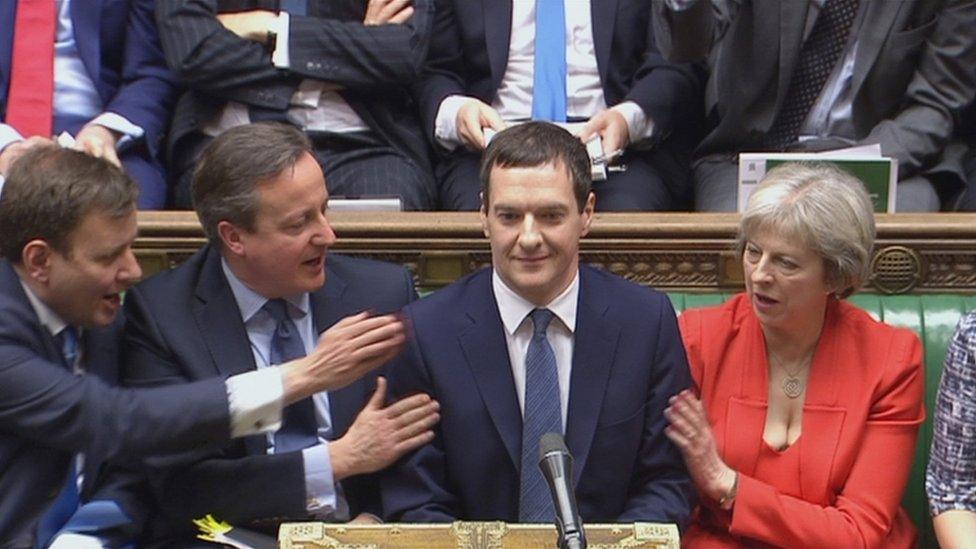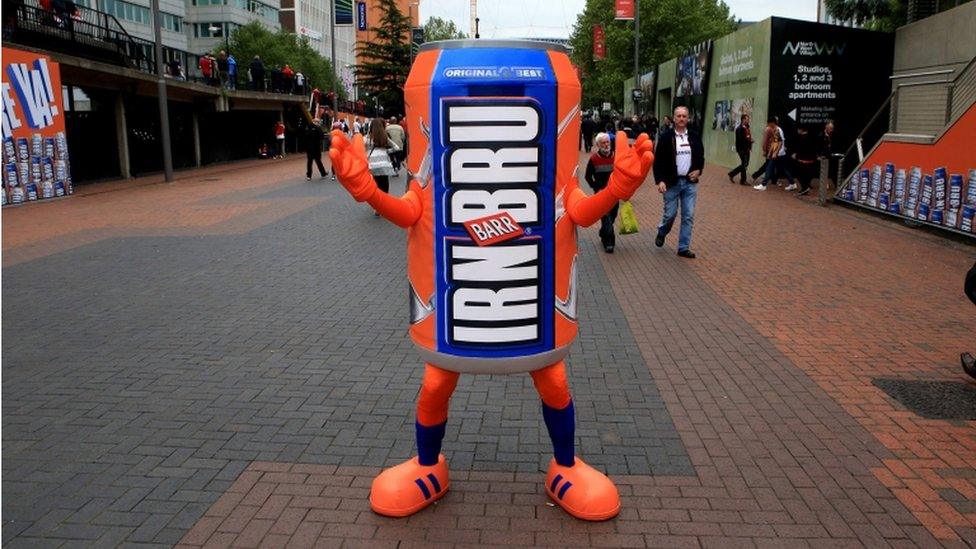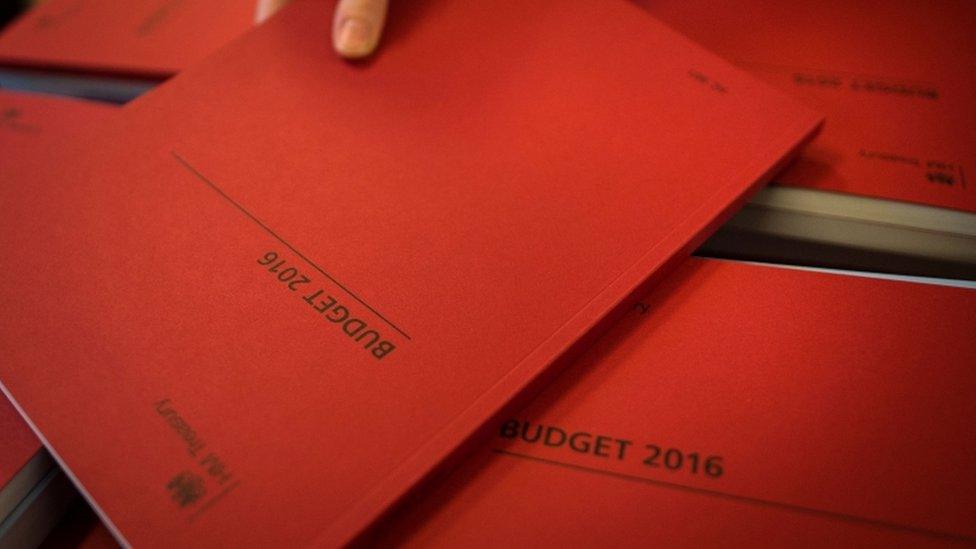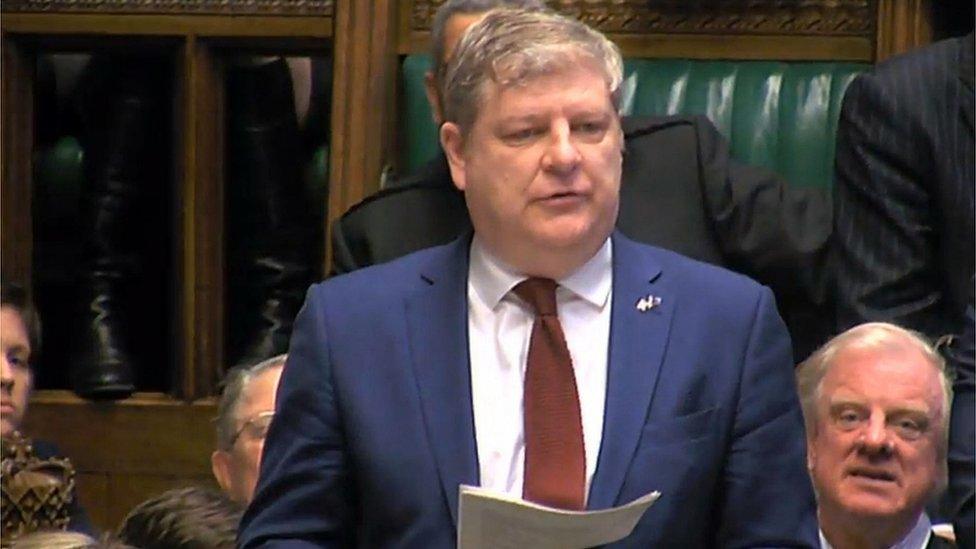Budget 2016: Osborne casting forward and backward
- Published

Drawing lessons from the fate of a mouse, his "poor earth-born companion", the poet Burns noted:
But Och! I backward cast my e'e.
On prospects drear!
An' forward, tho' I canna see,
I guess an' fear!"
I am uncertain as to whether there is much of the poetic in the soul of the Chancellor. But, still, Gideon was casting both backward and forward in his Budget statement today.
The backward bit came when he transformed an announcement of support for the North Sea oil industry into an excoriating attack upon the SNP.
Skill or chance
In a prolonged section - to the sound of his backbenchers jeering in the general direction of the Nationalists - George Osborne said that the tax support announced for the North Sea was only feasible because of "the broad shoulders of the UK."
Reflecting back to the independence referendum, Mr Osborne argued that Scotland was better together with the rest of the UK. Cue growling from said SNP benches.
But there was a look forward as well - to the EU referendum due on June 23. Much of Mr Osborne's budget was aimed at strengthening support for the PM's position in that plebiscite - or, more precisely, avoiding issues which might see that position deteriorate.
The Chancellor is a keen backgammon player. (As am I. Maybe I should challenge him to a match.) He will be aware of the tedious debate as to whether backgammon is a game of skill or chance.

The tax on sugary soft drinks has already been dubbed the "Irn Bru Tax" by Scottish social media users
The answer is that, in a single game, chance can allow the beginner to triumph. Over a prolonged series of games, skilled judgement will generally favour the experienced player.
Mr Osborne was playing the long game today. Nothing much to frighten folk - or, again to deploy precision, Conservative back-benchers and supporters. Those who will figure largely in the already fractious EU referendum.
So no increase in fuel duty. No increase in beer, cider or spirits duty. A series of individually tailored announcements, even to the level of a leisure centre in Helensburgh (credited to Ruth Davidson.) Keeping the local lieges happy.
The only exception to that policy would appear to be the sugar tax. Tory folk are wondering whether such a move is intuitively Conservative. Weren't they against new taxes? Weren't they against prescribing for individual lifestyles?
Healthy outlook
Certainly, sundry naughty MSPs are recalling that Ruth Davidson expressed such views rather forcibly in a previous interview in which her essential "libertarian" soul railed against taxing sugar. Would it, she demanded, be the Curly Wurly next?
Mr Osborne set the announcement in the context of encouraging a healthy outlook. This aspect was reinforced by the plan to divert any revenue raised to school sport in England, with a Barnett consequential chunk for Scotland.
More cynical observers saw the move as a way to mask a tax rise. "It is all about the spondulicks", said one senior politician. Either way, the industry now has two years in which to respond before the tax kicks in.
More generally, though, the Budget was calibrated - at least in part - to enthuse supporters of the PM and thus underline the case for backing him in the EU referendum.

Indeed, Mr Osborne made this point explicitly when he cited the Office for Budget Responsibility as warning of the disruption which might attend Brexit, while stressing that the OBR remained politically neutral.
The income tax moves are particularly intriguing here in Scotland, coming on a day when the Scottish Parliament will endorse the new tax powers en route to Holyrood. Those tax powers will be in play from April 2017.
Keep pace
That means it is open to MSPs to decline to implement the Chancellor's plan to increase the threshold at which higher rate income tax kicks in. Labour and the Liberal Democrats have criticised the scheme - and pointed to their own distinctive tax plans.
The Scottish Conservatives back the Chancellor in line with their argument that Scotland should, at a very minimum, keep pace with the UK tax levies.
And the SNP? John Swinney, the Finance Secretary, told me he was not persuaded of the need to cut the levy upon higher earners at this point - which will be the result of the Chancellor's move. However, he stressed we had to await the detail of his party's proposals.

SNP MPs including Angus Robertson were unimpressed by the Chancellor's claim an independent Scotland could not have afforded to cut taxes for the oil industry
As forecast, today's Holyrood debate on new powers was relatively tame, although notably consensual. There were even tears, mostly from the presiding officer, as departing MSPs Alex Salmond and Duncan McNeil delivered their final speeches.
Mr Salmond, as is his cheeky way, had a little sting in the tail. It was, he said: "Goodbye from me. For now." He explained later that he meant that he would hope to return in the event that Holyrood became an independent parliament.
Webcast questions
PS: I will be conducting a webcast interview with Kezia Dugdale, the Scottish Labour leader, at the end of this week. Could use loads more questions for her. Please respond.
PPS: On the subject of the EU referendum, I chanced this morning to be casually re-reading Roy Hattersley's elegantly droll memoir, Who Goes Home? (Little, Brown, 1995)
Mr Hattersley was a minister, frequently dealing with European matters, when Britain last voted in a European referendum in 1975.
On divisions within Labour, the then governing party, he notes: "The referendum which followed was not an attempt to hide the divisions in the party's ranks. The gulf was too wide and deep to be hidden by any contrivance of that sort."
On the choice confronting voters, he argues: "They put a cross against their prejudices and - most important of all - supported the position taken up by the politicians they supported.
"A referendum campaign with Harold Wilson, Ted Heath, Roy Jenkins, David Steel and (rather reluctantly) Margaret Thatcher on one side and Enoch Powell, Tony Benn, Barbara Castle and Jack Jones of the Transport and General Workers Union on the other can only have one result.
"If we ever have another referendum in this country, it will be decided on much the same, irrelevant and inadequate, considerations".
- Published16 March 2016
